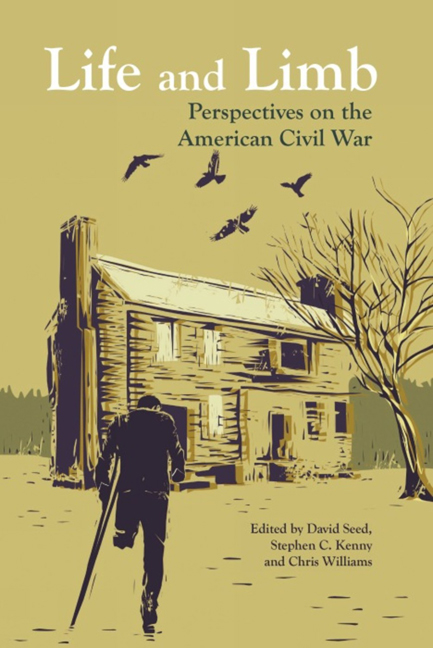Book contents
- Frontmatter
- Contents
- List of Illustrations
- Acknowledgements
- Introduction: Civil War Voices and Views
- MEDICAL AND SURGICAL MEMOIRS
- ACCOUNTS OF NURSING
- MEDICAL FACILITIES AND PATHOLOGY
- PHOTOGRAPHY
- AMPUTATIONS AND PROSTHETIC LIMBS
- IN THE FIELD OF BATTLE
- Diary: October 29, 1862: The Civil War Diary and Letters of Sergeant Henry W. Tisdale
- The Battle of Shiloh: Aftermath: ‘The Battle of Shiloh’ from Annals of the War
- The Battle of Ellyson's Mills: A Confederate Surgeon's Letters to His Wife Spencer Glasgow Welch
- Aftermath of Battle, Cedar Mountain, Virginia: ‘Personal Recollections of the War’
- After the Battle of Winchester: A Virginia Yankee in the Civil War
- The Negro as a Soldier
- Army Life in a Black Regiment
- POST-WAR NARRATIVES
- Contributors
- Select Bibliography
- Index
- Plates
The Negro as a Soldier
from IN THE FIELD OF BATTLE
- Frontmatter
- Contents
- List of Illustrations
- Acknowledgements
- Introduction: Civil War Voices and Views
- MEDICAL AND SURGICAL MEMOIRS
- ACCOUNTS OF NURSING
- MEDICAL FACILITIES AND PATHOLOGY
- PHOTOGRAPHY
- AMPUTATIONS AND PROSTHETIC LIMBS
- IN THE FIELD OF BATTLE
- Diary: October 29, 1862: The Civil War Diary and Letters of Sergeant Henry W. Tisdale
- The Battle of Shiloh: Aftermath: ‘The Battle of Shiloh’ from Annals of the War
- The Battle of Ellyson's Mills: A Confederate Surgeon's Letters to His Wife Spencer Glasgow Welch
- Aftermath of Battle, Cedar Mountain, Virginia: ‘Personal Recollections of the War’
- After the Battle of Winchester: A Virginia Yankee in the Civil War
- The Negro as a Soldier
- Army Life in a Black Regiment
- POST-WAR NARRATIVES
- Contributors
- Select Bibliography
- Index
- Plates
Summary
Christian Abraham Fleetwood (1840–1914) was a Baltimore-born African American who served in the US Coloured Infantry 1863–66, receiving the Medal of Honor for valour in battle. The Negro as a Soldier (Washington, DC: Howard University, 1895) was a pamphlet published for the Negro Congress of that year. Fleetwood was attempting to rectify a lack of attention to African American troops in the Civil War, partly through the memorializing image given below. Race theory was often incorporated in the assessment of soldiers. Roberts Bartholomew, for example, praised Americans for their toughness of muscular fibre, but believed that African Americans suffered from underdeveloped calves and flat feet, concluding that ‘the Negro soldier is, unquestionably, less enduring than the white soldier’ (Flint, ed., Contributions to the Causation and Prevention, p. 5).
[A]t the terrible mine explosion General B.F. Butler issued an order, a portion of which I quote, as follows:
‘Of the colored soldiers of the third divisions of the 18th and 10th Corps and the officers who led them, the general commanding desires to make special mention. In the charge on the enemy's works by the colored division of the 18th Corps at New Market, better men were never better led, better officers never led, better men. A few more such gallant charges and to command colored troops will be the post of honor in the American armies. The colored soldiers, by coolness, steadiness, determined courage and dash, have silenced every cavil of the doubters of their soldierly capacity, and drawn tokens of admiration from their enemies, have brought their late masters even to the consideration of the question whether they will not employ as soldiers the hitherto despised race.’
Some ten or more years later, in Congress, in the midst of a speech advocating the giving of civil rights to the Negro, Gen. Butler said, referring to this incident [battle in 1864]:
‘There, in a space not wider than the clerk's desk, and three hundred yards long, lay the dead bodies of 543 of my colored comrades, slain in the defense of their country, who had laid down their lives to uphold its flag and its honor, as a willing sacrifice.
- Type
- Chapter
- Information
- Life and LimbPerspectives on the American Civil War, pp. 161 - 162Publisher: Liverpool University PressPrint publication year: 2015



